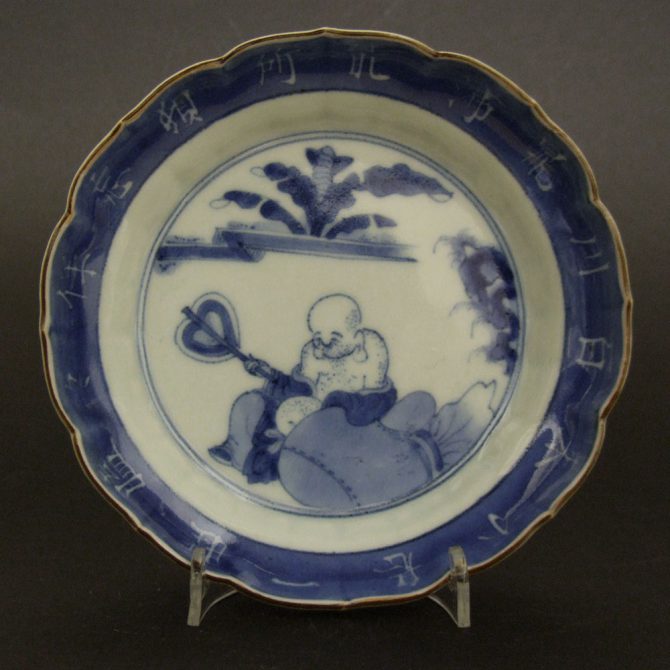
ARITA c.1760 – 1800 Japanese Porcelain
An 18th Century Japanese Blue and White Porcelain Shallow Bowl Depicting Hotei Seated Next to His `Sack Cloth` in a Landscape with a Banana Plant. Around him is a Zen Buddhist Text of Some Sixteen Characters Arranged Around the Rim of the Dish. The Inscription is Created Using the Sumihajiki (Wax resist) Technique.
SOLD
- Condition
- Perfect.
- Size
- Diameter : 15 cm (5 3/4 inches)
- Provenance
- N/A
- Stock number
- 22622
Information
Sumihajiki :
This type of ceramic decoration appears in Japan just after the middle of the 17th century, although its origins are much earlier. The effect created is that of painted white lines cutting through blue, this is achieved using a wax resist type paint called `sumi` which protects the white porcelain from the cobalt blue over-painting. The `sumi` is burnt off during the firing to leaving white lines to contrast against the blue.
Hotei :
Hotei was originally a Chinese deity called Budai. His name means `Cloth Sack`, and comes from the bag that he carries. According to Chinese tradition, Budai was an eccentric Chinese Zen monk who lived during the 10th Century. He is almost always shown smiling or laughing, hence his nickname in Chinese, the Laughing Buddha. In English speaking countries, he is popularly known also as the `Fat Buddha`. Budai is often depicted as having the appearance of an amply proportioned bald man wearing a robe and wearing or otherwise carrying prayer beads. He carries his few possessions in a cloth sack, being poor but content. His figure appears throughout Chinese culture as a representation of contentment. His image graces many temples, restaurants, amulets, and businesses. Amongst Westerners new to Buddhism, Budai is often confused with the historical Buddha, Siddhartha Gautama. However, the two are visually very distinct. Gautama is commonly depicted as being tall and slender in appearance (although since no images of him from his lifetime exist, this depiction of him is unverifiable and possibly idealized); Budai is short and overweight. (Buddha means `one who has achieved a state of perfect enlightenment` and there are several people who have been given the title.)Information edited and reduced from www.http://en.wikipedia.org/wiki/Budai
